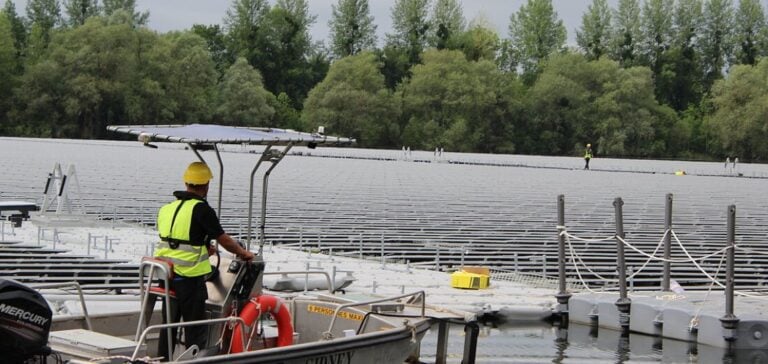Q ENERGY closes €50.4 million financing for its “Les Ilots Blandin” floating solar power project in France, strengthening its position in the European renewable energy market.
The project, backed by Crédit Agricole Transitions & Energies and Bpifrance, is located on a former gravel quarry in the Haute-Marne region of France, and covers 127 hectares of water.
On completion, the solar power plant will have an installed capacity of 74.3 MW, making it the largest floating solar power plant in Europe.
The plant comprises 134,649 solar panels mounted on floats.
This technology makes efficient use of unused space and contributes to the energy transition.
By supplying green electricity to around 37,000 inhabitants, the project is also expected to avoid the emission of 18,000 tonnes of CO2 per year.
Pre-commissioning is scheduled for the first quarter of 2025, placing“Les Ilots Blandin” at the forefront of innovative renewable energy projects on the continent.
Key role of financial institutions in the project
Q ENERGY ‘s financial partners for this project, Crédit Agricole Transitions & Energies and Bpifrance, underline the importance of the initiative in the context of the energy transition.
Through its role as “Climate Bank”, Bpifrance is demonstrating its commitment to supporting projects that promote decarbonization.
Pascale Courcelle, Head of Real Estate, Energy and Environment Financing at Bpifrance, stresses the importance of this financing as a direct contribution to achieving France’s climate objectives.
Crédit Agricole Transitions & Energies, through its Deputy Managing Director Christine Delamarre, emphasizes the institution’s central role in accelerating the development of renewable energies.
This partnership reflects the desire of banking institutions to finance sustainable infrastructures and play an active part in the energy transition.
By facilitating access to capital for projects like “Les Ilots Blandin”, these institutions are supporting urgently needed green growth in Europe.
Technological innovation and environmental impact
The “Les Ilots Blandin” project stands out for its adoption of floating solar technology, an innovative solution that optimizes the use of unused water surfaces while minimizing land-use conflicts.
This approach improves energy efficiency and reduces the impact on the local environment.
At the same time, the use of floating solar panels contributes to better temperature regulation of the panels, increasing their efficiency and reducing evaporation from water bodies, a crucial advantage in regions affected by water shortages.
Q ENERGY thus positions “Les Ilots Blandin” as a model for the future of renewable energies in Europe.
The potential impact of this project goes beyond the production of green electricity; it could serve as a basis for the future development of similar projects across Europe, promoting innovative approaches to climate challenges.
Outlook for the European renewable energy market
The financing of projects such as “Les Ilots Blandin” reflects a growing trend in Europe to invest in innovative energy infrastructures.
Energy companies, supported by financial partners, are strengthening their ability to meet the European Union’s CO2 emission reduction targets.
Investments in less intrusive and highly efficient floating solar technologies could see a significant increase in the coming years.
As Europe continues to promote clean energy solutions, projects like Q ENERGY play a central role in diversifying the energy mix.
The support of financial institutions is essential to accelerate the energy transition, by facilitating access to the funds needed for large-scale projects.
With “Les Ilots Blandin” scheduled for commissioning in 2025, the project could well inspire other similar initiatives, reinforcing Europe’s role as a pioneer of innovation in renewable energies.






















